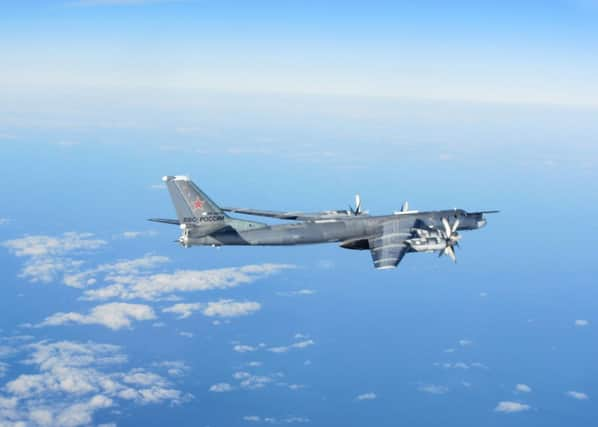Scots Typhoons scrambled to intercept Russian bombers


The Russian planes were detected over the Channel just south of Bournemouth on Wednesday and Typhoons were launched as part of a Quick Reaction Alert (QRA) from Royal Air Force bases at Lossiemouth, in Moray, and Coningsby in eastern England. RAF fighters came within 1,000ft of the bombers before escorting them out of the UK area of interest.
In a statement, the MoD said that “at no time did the Russian military aircraft cross into UK sovereign airspace.”
Advertisement
Hide AdAdvertisement
Hide AdHowever a leading defence expert has claimed that Russian bombers flying close to UK airspace could be viewed as an act of “aggression” to coincide with the public inquiry into the death of KGB spy Alexander Litvinenko.
Elizabeth Quintana, a senior research fellow at defence think-tank the Royal United Services Institute said the incident was “unusual” and might be linked to Britain beginning an inquiry into the death of the outspoken Kremlin critic in London nine years ago.
She said: “Normally Russian Bears come past Norway and down the North Sea. It could have been used to probe the RAF speed of reaction south.
“Flying any military aircraft in or close to the sovereign airspace of another country signals displeasure or at worst aggression.”
A QRA is launched to intercept aircraft that cannot be identified by any other means. In this case, the Russians would either not have filed a flight plan, not transmitted a recognisable surveillance radar code, or failed to talk to air traffic control.
Last year, Nato conducted more than 100 intercepts of Russian aircraft, about three times as many as in 2013, amid sharply increased tensions between the West and Moscow over the Ukraine crisis.
The latest detection of the Russian planes coincided with day two of the public inquiry into the death of former Russian spy Litvinenko, 43, who is thought to have been working for the British secret service MI6 during his time in the UK.
He died at University College Hospital nearly three weeks after he had consumed tea laced with polonium-210 at the Millennium Hotel in London’s Grosvenor Square.
Advertisement
Hide AdAdvertisement
Hide AdTuesday’s hearing heard opening statements which included claims that Russian president Vladimir Putin ordered the former’s spy’s murder.
The public inquiry also heard that his post-mortem examination was “one of the most dangerous ever undertaken in the western world”.
During it, Dr Nathaniel Cary, a Home Office forensic pathologist and his colleagues wore safety suits and hoods, into which air was piped.
Ben Emmerson QC, the barrister representing widow Marina Litvinenko described her husband’s murder as an “act of nuclear terrorism on the streets of a major city”.
He added: “He was killed partly as an act of political revenge for speaking out, partly as a message of lethal deterrence to others, and partly in order to prevent him from giving evidence as a witness in a criminal prosecution in Spain, a prosecution that would have exposed Putin’s links to an organised crime syndicate operating in the country.”
FOLLOW US
SCOTSMAN TABLET AND MOBILE APPS